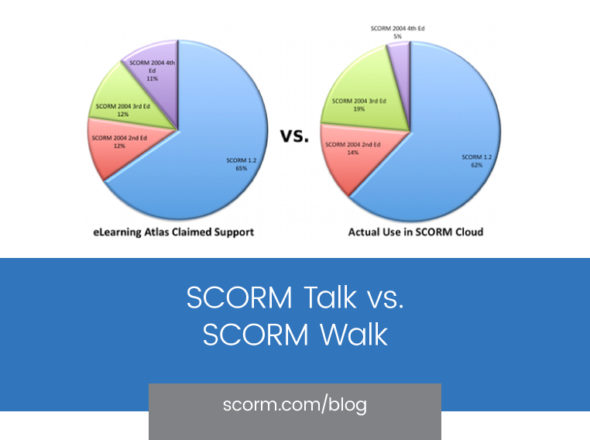Moodle is the leading open source LMS (based on no real research on my part whatsoever, mostly, I’ve just heard the name more than Sakai or some other alternatives). They’ve done a great job creating a product that is broadly used and reasonably well thought of. SCORM, frankly, has been a bit of a challenge for Moodle (as it is for so many folks). Application service providers (ASP’s) and companies with in house LMS’s come to us regularly for help with this particular problem, but Moodle has taken it on themselves, and I personally applaud them for that.
Recently, some of the folks in the Moodle community have put some real effort into moving the platform toward SCORM 1.2 certification. As Dan Marsden mentions, the most recent versions of Moodle can pass the test suite, and they’re moving toward formal certification. He also mentions the following with regard to SCORM 2004:
I couldn’t finish this post without “mentioning” SCORM 2004…. this is still a way off for us, the common statement is “some of it’s there, but it’s missing sequencing and navigation”. I don’t expect we’d get this done before Moodle 2.0 release, It’s hard to balance whether time should be spent on the SCORM 2004 stuff, or the other structural/scalability issues.
I can’t argue with his thoughts at all… I would want nothing less than to try to build a SCORM 2004 LMS on a platform that has other issues. SCORM can be finicky, and SCORM 2004 particularly so. SCORM 2004 (and frankly, some of the finer points of SCORM 1.2) are without doubt challenging problems.
They are, however, problems that we’ve solved to a very large degree with our [intlink id=”scorm-engine”]SCORM Engine[/intlink]. We already have the plug-able architecture that allows us to embed the player in other applications. We’ve also had “a few” prospects come to us asking if we could embed the SCORM Engine in Moodle. (Older versions of Moodle, in particular, struggled with SCORM conformance. From what I’ve heard, the Moodle SCORM forums are actually more active than the ADL forums themselves.) So, partly as an exercise, and partly to explore the possibilities, we’ve started down the path of integrating the SCORM Engine with Moodle. Already, just a week or two later, we have this…

This is one of the ADL Photoshop courses running via SCORM 2004 in the context of our local Moodle installation. It includes legitimate SCORM 2004 sequencing and navigation in a fully conformant manner, and even reports overall status back via the Moodle API. On top of that, the SCORM Engine would allow an integrated Moodle/SCORM Engine to benefit from all of the SCORM Engine functionality, including high end compatibility and delivery customization. (OK, I think it’s cool, but I am admittedly a dork, no doubt.) I’m 100% convinced that we can very quickly take this to a state of elegant integration. Which leads me to our…
Challenging Problem
How do we offer this to the community? I am well aware that Moodle is open source. Clearly, I am aware that the SCORM Engine is not. The various open source licenses are a problem for another time (and likely, a lawyer with his or her hourly fees).
What would you (and by you, I mean, presumptively, the Moodle user who has found their way to this post somehow) expect in the offering? We are, admittedly, a for-profit company. We would like to find a way to offer this to you where it solves your problems and compensates us appropriately. In many ways, we think of ourselves as a software cooperative, solving this challenging problem on behalf of many. So how can we do that effectively for you? What would you be willing to pay to have this problem solved?
What SCORM problems, other than SCORM 2004, can we solve for you in particular? Are they already solved by the SCORM Engine (feel free to try the Engine implementation available as the core of TestTrack if you like)?
Would you be willing and able to introduce a non-open source project in the context of your Moodle implementation, provided we could work out the license issues?
Enough questions from the blogger, I say. It’s time to cut this off here. Feel free to offer commentary via the blog or by contacting us here.


